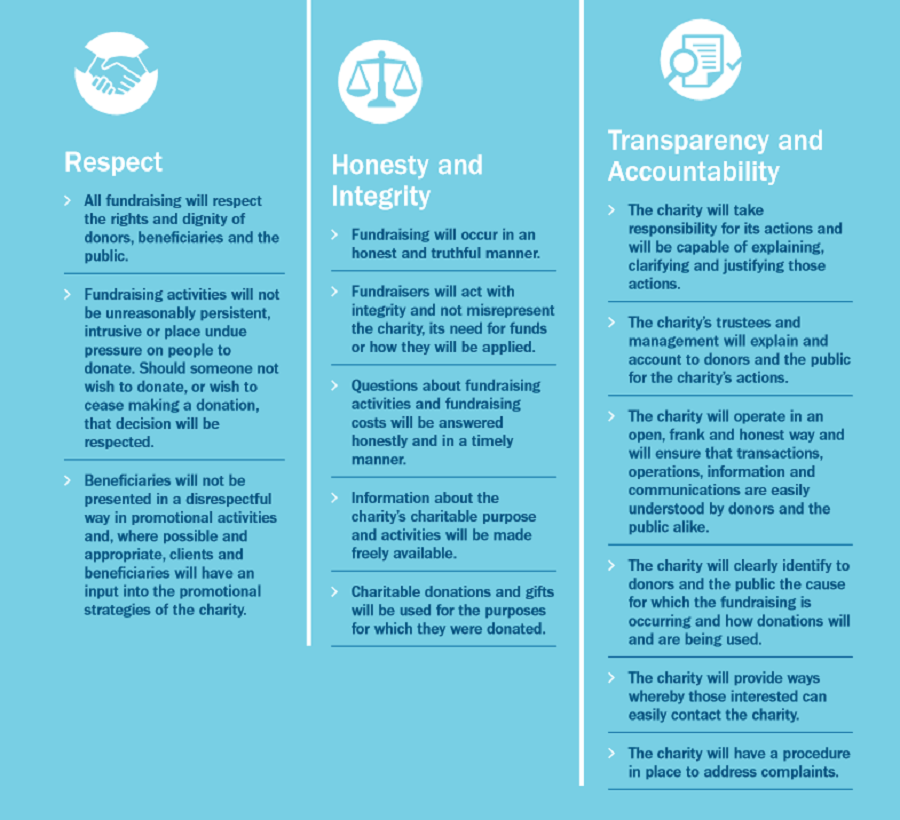Charities Regulator's Fundraising Guidelines
On 28 September 2017, the Charities Regulator. published a comprehensive set of fundraising guidelines for charities, which aim to enable trustees to protect their charities’ reputations and boost public trust and confidence in their organisations.
If your organisation is a charity and is fundraising from the public then you must acquaint yourself with these guidelines.
The guidelines are broken into 10 sections over 17 pages so are very accessible:
- Section 1 Background and Introduction
- Section 2 Who should read these Guidelines?
- Section 3 Principles
- Section 4 Donors and Donations
- Section 5 Responsibilities of Charity Trustees
- Section 6 Responsibilities of Management
- Section 7 Responsibilities of Fundraisers
- Section 8 Data Protection
- Section 9 Financial Transparency & Accountability
- Section 10 Monitoring
- Appendix Useful Reference Points
Who should read these Guidelines?
The regulator is very clear in these guidelines that “Charity trustees have overall responsibility and accountability for their charity and this includes fundraising activities of the charity”
This means that if you are on the broad of a charity you need to have full oversight of the fundraising activities your organization is undertaking.
“Trustees should ensure that all key people within their charity who are involved in fundraising implement the approaches and practices set out in these Guidelines”.
Pleading ignorance if something goes wrong is not an acceptable line of defense for trustees when it comes to your fundraising activity anymore.
Equally, management and those working in fundraising within a charity need to ensure that their trustees take on their responsibilities to oversee fundraising. The guidelines are there to be read for those who need to manage fundraising within your organization bot upwards and downwards.
Principles
The principles that underpin the guidelines and therefore should underpin your charities fundraising are common sense and consist of:
- Respect
- Honesty & Integrity
- Transparency & Accountability.

Things To Note:
The guidelines are divided into a series of ‘must’s and should and what is meant by them is the following:
“In these Guidelines - ‘must’ means that something is a legal or regulatory requirement or a duty that trustees must comply with, and ‘should’ means that something is good practice and the Charities Regulator expects trustees to follow and implement it within their charity”.
Help Implementing The Guidelines
Charities Institute Ireland have an excellent resource on implementing the guidelines which you can access here: www.charitiesinstituteireland.ie/implementation-resource-materials
They also have excellent guidelines to ensure people at fundraising level are doing the best they can to follow best practice fundraising and have a series of guideline booklets for:
Cash Collections | Digital Fundraising | Payroll Giving | Working with Children | Charity Shops | Events | Telemarketing Fundraising | Direct Recruitment | Lotteries | Volunteers
That can be accessed here www.charitiesinstituteireland.ie/the-cii-codes
Training
The Wheel provides training to its members that introduces the guidelines to organisations and brings them through what they need to do. It’s introductory level so suitable for trustees, staff, fundraisers or anyone new to the guidelines or to fundraising. The Wheel provide training regularly within its calendar www.wheel.ie/training or you can contact The Wheel directly to deliver the training on site to your group, or groups locally. The Wheel has facilitated many of these sessions through SICAP and PPN training networks around the country.
Additional Charities Regulator Guidelines
The Charities Regulator regularly publishes Guidance Documents in easy to read formats. Some of particular note include: 1) Internal Financial Controls; and 2) the responsibilities of Charity Trustees, 3) Guidance Note for Registered Charities on Fundraising through Clothing label Collections and Clothing Bank Collections, 4) Guidance on Anti-Money Laundering and Counter-Terrorism Financing for Charities and 5) Overview of the proposed Charity Financial Accounting Regulations and SORP. If you and your board / management committee have not yet downloaded and read them, then we urge you to do so now - access them here >>
The Charities Regulator website is: www.charityregulator.ie.
